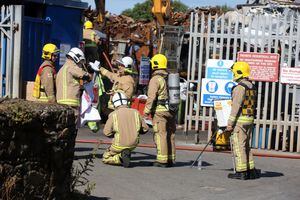Service was right to disband retained firefighters, says chief
DISBANDING the retained firefighters section in 2013 has saved more than £300,000 and there are no plans to revive the unit, the Fire and Rescue Service’s chief officer has said.

A huge fire at Guernsey Recycling earlier this month pushed the Fire & Rescue Service to the limits of its capability, with all available staff, including off-duty personnel, having to be called upon.
It was said at the time that any other serious incident at the same time would have made it necessary to call out the full Airport Fire & Rescue Service and close the airport.
However, chief officer Jon Le Page said that while a unit of retained firefighters would have helped, it was not needed and the savings made since its dissolution outweighed the benefits of running a back-up service.
‘A full review of the Bulwer Avenue incident is currently taking place, which will include the availability of manpower,’ he said.
‘Results of that review are not anticipated for at least a month. However, following previous significant incidents we have reviewed the availability of manpower in relation to what the Retained Section could have provided and it was concluded that while the ability to call on a Retained Section would have provided additional support, it was not necessary.
‘This aligns with the review at the time of disbanding the Retained Section.’
He said retained personnel attended just 11 incidents between January 2000 and April 2013.
These included fires at the Idlerocks Hotel in 2003 and 2012 and the Manor Hotel fire in 2000, in addition to house, furze, thatch and store fires.
He said thought had been given to an unpaid, volunteer-only service, but this would still have come at a cost.
‘This was considered at the time of disbanding the Retained Section.
‘However, there is a large cost associated with providing personnel protective equipment, approximately £2,200 per person, and statutory training courses for operational firefighters, whether they are paid a wage or not, so the difference in costs are not significant.
‘Although the main reasons were cost and infrequency of deployment, the provision of training and maintaining the individual’s competence within very few training hours per week was very difficult and, due to the infrequency of incidents, there were continual recruitment and retention issues, which meant that we were always trying to get new recruits up to standard and having a large turnover of personnel protective equipment.’
The decision to close the section was ultimately about striking a balance between running the service as efficiently as possible and serving the needs of the community.
‘Disbanding the Retained Section achieved significant savings – £315,000 to date – without seriously compromising our ability to deal with incidents,’ said Mr Le Page.
‘It is also worth noting that, should an incident of such a scale occur that we needed additional support, we have arrangements in place to receive support from the UK and Jersey.
‘We have not needed to receive such support to date.’





